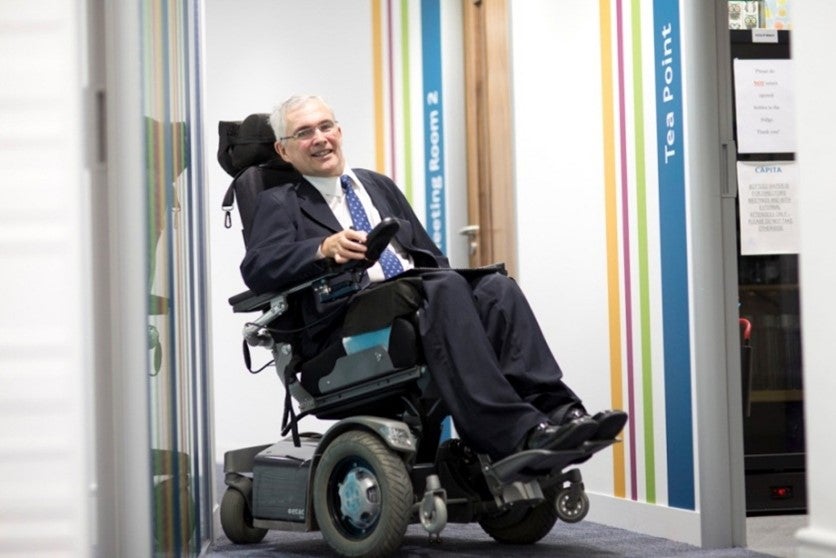As a severely disabled person, I know how vital it is that UK law on assisted dying is changed
I am not scared to die but I want choice and control over how I manage that dying process


Your support helps us to tell the story
From reproductive rights to climate change to Big Tech, The Independent is on the ground when the story is developing. Whether it's investigating the financials of Elon Musk's pro-Trump PAC or producing our latest documentary, 'The A Word', which shines a light on the American women fighting for reproductive rights, we know how important it is to parse out the facts from the messaging.
At such a critical moment in US history, we need reporters on the ground. Your donation allows us to keep sending journalists to speak to both sides of the story.
The Independent is trusted by Americans across the entire political spectrum. And unlike many other quality news outlets, we choose not to lock Americans out of our reporting and analysis with paywalls. We believe quality journalism should be available to everyone, paid for by those who can afford it.
Your support makes all the difference.The opportunity to celebrate our life, to say goodbye to the people we love, and to slip away peacefully on our own terms, avoiding unnecessary pain and suffering – is that not how all of us would want to go?
This was the picture painted so movingly by Alice Snape in The Independent this week, as she described travelling abroad to attend a final goodbye party for a dear family friend. This friend was suffering in agony from advanced multiple sclerosis and had opted to die with assistance from a doctor rather than endure a painful end.
I have been an electric wheelchair user for 40 years and enjoyed the choice and control over my life that disability activists campaigned for, year after year. Yet some of those activists, who have considerable influence, are now arguing that I should be denied that choice and control at one of life’s most important events, the dying process.
I am not terminally ill, but one day I may be. I am not scared to die but I want choice and control over how I manage that dying process. While over 206 million people live in places with some form of legislation that enables assistance to die, it is not an option in this country. The UK upholds a blanket ban on assisted dying, despite 84 per cent of the public supporting this option being made available for terminally ill Brits. Support for this type of law is similarly high among disabled people. I am proudly among that number and believe that a safe, compassionate assisted dying law here is long overdue.
I know that transparent, safeguarded assisted dying legislation and protections for disabled people can co-exist and work effectively, and there is international evidence to prove it. In Oregon, for example, a tightly-restricted assisted dying law has been in place for over 23 years. Disability Rights Oregon claims it has never received a complaint of abuse or attempted abuse under the Oregon Death with Dignity Act.
Meanwhile, it has provided choice and compassion to a great many dying Oregonians and the legislation has worked so effectively that it has since been replicated in states across the US, Australia and now New Zealand. This is the model that I and many others believe is right for the UK, too.
I also recognise that the current law contains far more risks for potentially vulnerable people, and that includes me and millions of other disabled people. The reality is that prohibiting assisted dying does not make it go away and there are currently no workable safeguards to protect disabled people. It simply forces dying people to suffer against their wishes or resort to unimaginable actions to control their deaths – often in secret, without the possibility of open conversation or exploration of other potentially beneficial options.
Currently, for those few Brits who can afford it and somehow manage to escape lockdown and travel bans, there is Dignitas in Switzerland – but this involves putting their loved ones at risk of prosecution for their involvement, travelling to a foreign country, and often dying before they are ready.

For those without the funds, some may be able to refuse treatment that is keeping them alive and be sedated while their disease consumes them, or while they starve or suffocate. But this can involve a drawn-out death, with no guarantee that suffering can be relieved, and it is not an option for all illnesses.
The only choice remaining is to take matters into their own hands. These deaths are often violent and painful, can involve multiple attempts, and cause untold devastation to those left behind.
Fortunately, more and more parliamentarians are waking up to what the assisted dying ban really means. Many MPs and peers of all parties are now calling for a review of our cruel and outdated legislation, and the health secretary recently acknowledged the need for more information on the impact of the current law, including suicides by terminally ill people.
MPs need to fully understand how the current law is operating if they are to make informed decisions about what is right for our country and citizens. That includes understanding the views of diverse groups – most importantly dying people and their loved ones, but also healthcare professionals, the police, and disabled people.
Personal choice, autonomy and control are values that many disabled people hold dear. But claims by a vocal minority that all disabled people are opposed to a change in the law – as if we are a single, homogenous group – have caught many politicians’ attention.
A study published last month (January 2021) on the views of disability rights organisations on assisted dying revealed only 4 per cent have an official position against a change in the law. Claiming that this is a widely held opinion among disabled people and the organisations that support or represent us risks stifling debate and creating a toxic environment where those who are supportive of assisted dying feel unable to express their views openly.
Other jurisdictions around the world have had a civil, thorough debate, examined the evidence, and concluded that changing the law on assisted dying is the right thing to do. The UK is increasingly the outlier.
With momentum building around the world and at home, it is inevitable that before long an assisted dying bill will be brought before parliament again. MPs must be fully informed on the reality of the current law, on potential models for change, and on the views of their diverse constituents – the majority of whom, with and without disabilities, want to see the UK become the latest country to legislate for assisted dying.
Join our commenting forum
Join thought-provoking conversations, follow other Independent readers and see their replies
Comments